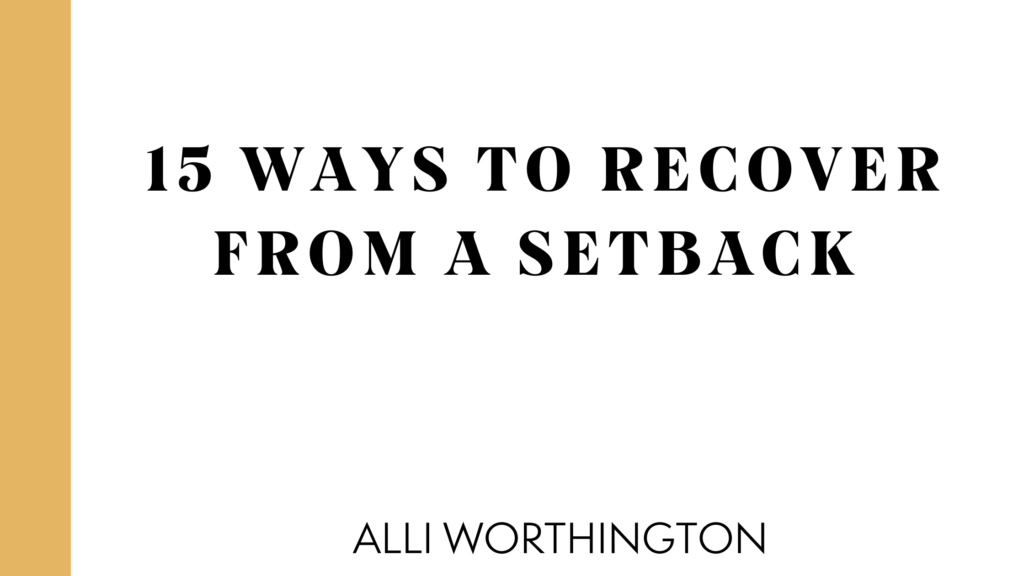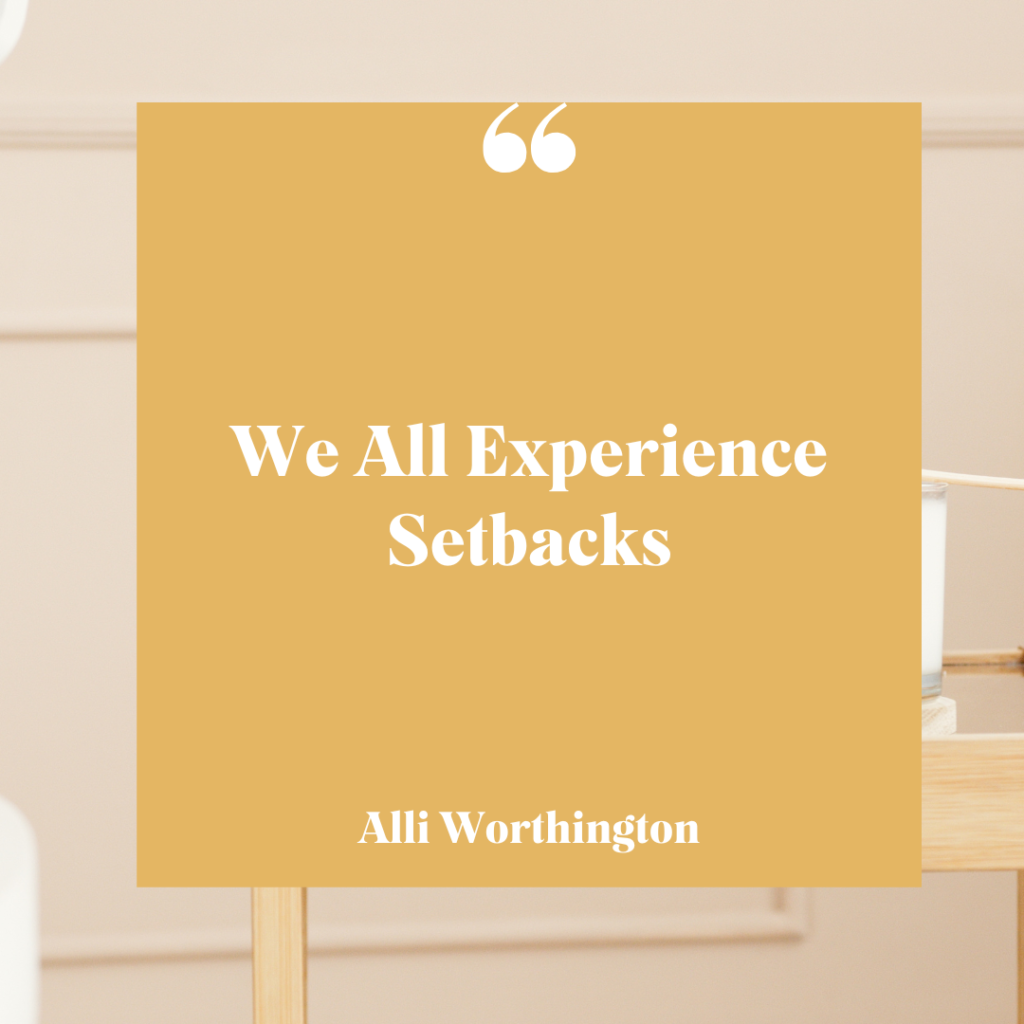You know building your brand is a crucial step to crafting your dream business. This workbook is designed with you in mind to simplify those steps.
Apply for Coaching
15 Ways to Recover from a Setback

It’s no secret that we all experience setbacks in life. Setbacks happen when things take an unexpected turn, and we feel like we’re back at square one. These experiences can come in a variety of forms, including:
- job loss,
- failed businesses,
- broken relationships,
- the loss of a loved one,
- divorce,
- a poor health diagnosis,
- mental health decline,
- or disappointment.

While we will all experience setbacks, our personalities and the severity of the situation will influence our ability to deal with them. Some setbacks are easier to navigate and emerge from, while others take much more time to heal.
So how do we learn from these challenging times?
Despite the severity, setbacks bring normal feelings of frustration, sadness, disappointment, and anger. However, what we do with those feelings will determine how we move forward.
I have a few suggestions to help you, whether you believe you can learn from the experience you’ve gained in the middle of a setback or see it as a reason to quit.
Here are 15 ways to help you get past adversity and set a pace for change and growth in a setback:
1. Recognize Setbacks Are A Part of Moving Forward.
Setbacks happen. Work through the expectation and accept that you will face challenges and adversity when they come. Recognizing that dealing with failures and setbacks is a part of moving forward! No one wants to fail, but thinking that you will never fail is unrealistic. Take responsibility for your part in the situation so that you can learn from it.
2. Engage in Introspection.
After experiencing a setback, recognize that you will need some time to process what happened to you. It’s okay to have feelings of frustration, sadness, disappointment, or anger. Permit yourself to do so, and while you do, avoid hasty decisions.
There’s a place for pep talks and motivational rants, but you may not be in the mood for those right away. When you allow yourself time to observe your mental and emotional health, you position yourself to make healthy choices when you have the opportunity arises.
3. Feel For A Time
Grief is necessary. Without it, you run the risk of making the same mistakes in a cyclical manner, running away from former ones. I can agree that there are few things as comforting as a day in bed, binge-watching your favorite shows as a way to wallow in the pain.
However, you can’t live life that way. You may feel the grief of the setback you’ve experienced for months to come, but that doesn’t mean you continue to isolate yourself. Give yourself a moment to experience the pain and feel all the emotions, and then give yourself a deadline.
Schedule a day that you will meet with a licensed therapist, a coach, or an accountability group to process your emotions. They’ll help you take the necessary steps to grow outside of the comfort of your covers.

4. Take a break.
Play is a great way to rest mentally, especially when navigating a setback. Although finding the motivation to play can be hard, remember that it is a necessary part of the creative process.
Do something fun, go outdoors, do a coloring book, or take a break from social media and give your mind a break. Everyone needs hobbies to be healthy. It is hard to bounce back if you have nowhere to turn to when you are in pain.
5. Reflect with a trusted friend.
When you experience failure, ask a trusted friend for honest feedback. Good friends will give you candid feedback, let you vent, and provide the support and encouragement to help you take positive steps forward.
If you question how to approach the conversation, assure them of your desire to make a change. The humility you exhibit will facilitate a safe space where those who may want to shield you from additional pain can feel welcome to share freely.
6. Learn from failure.
Ask yourself, “What can I learn from this experience?” when making future decisions. Think about the possible setbacks that will occur and plan for them. We need to anticipate that we will run into problems and have a plan of action ready for when those problems occur.
Don’t overcomplicate this. Coaches can help with this immensely. Sign up for The Coach School waitlist. When you join, you will have access to live coaching with me as well as a private mastermind so that you can strategize a team of trusted individuals who care about your success.
You have the passion. Now it’s time to elevate your skills! Learn more about The Coach School to take the mystery out of how to build a successful coaching practice and a sustainable business.
7. Be Objective.
Get out of your head and distance yourself from the situation. Write the facts down as if you were a third party looking in. Simple bullet points will do. Once you write down the events in sequence, ask yourself various questions to help you avoid future setbacks.
Some questions you may want to consider are:
- What was the intended outcome?
- Was there an event or decision that created a change in course?
- Could I have done anything differently to prevent things from happening?
- Is there anyone I can reach out to next time to help?
- Are there additional skills I need to learn to avoid this situation in the future?
- What have I learned as a result?
This is a great list to discuss with your coach in the future. They will have additional insight to lend as well.

8. Make a Habit of Reading Biographies
You’ll be relieved to hear that setbacks are nothing new. The greatest influencers and thought leaders have endured them. In fact, many of the reasons we recognize their names are because of how they recovered from the setbacks they faced in life.
Some of my favorite biographies and autobiographies are Unbroken by Laura Hillenbrand, Into Thin Air by John Krakauer, I Know Why the Caged Bird Sings by Maya Angelou, and On Writing by Stephen King.
They help me to recognize that not only am I going to make it through the setbacks I face but that others have had to deal with a lot more than I have.
9. Consider What’s in Your Control
It may be time to develop an internal locus of control. The locus of control is the psychological concept that refers to the extent people believe they are in control. Understandably, some facts will influence your life that will be outside of your control. However, those with an internal locus of control often move forward and recover from setbacks more quickly than those with an external locus of control.
According to Very Well Mind, those with an internal locus of control are less likely to blame outside forces or credit luck and chance with their success or failure. Instead, they tend to take responsibility for their actions more often and enjoy confidence in the face of challenges.
Those with an internal locus of control recognize that just as they can lose big, they can also win big if they do the work it takes to grow.
10. Manage your Blind Spots.
Overnight successes don’t exist, even in our social media-crazed culture, but thankfully, neither do overnight failures. Failure is a response to a series of actions we commit to over time, and this means that we need to work hard to grow more conscious of our blind spots.
If you’re serious about recovering from a setback, you can reflect on the interactions you’ve been having with others. Nurturing self-awareness within yourself is necessary for the process. How do your team members or clients respond when you address them? When attempting to mobilize others, are you met with a lack of inspiration or apprehension?
Explore these nuances with your coach and those in your mastermind group so that you can identify your blind spots.
11. Lighten Up
I recognize that the phrase, “Lighten up,” could be triggering for some of you, but there’s even more of a reason to do so if that’s the case. If there’s ever a time to have a sense of humor, this is it! The Mayo Clinic reports laughter stimulates organs, soothes tension, and relieves your stress response.
Do something that will make you laugh big, hearty laughs. Call a funny friend, watch some entertaining youtube videos or your favorite comedy movie. This will clear your mind, even if just temporarily. Once you return to the problem, you can focus on it.

12. Take Risks.
Be flexible and open-minded to trying new approaches. Some people become inflexible and cautious after a setback, but this is always counterproductive to your future goals. Taking risks is necessary for success! Don’t insulate yourself or grow fearful of making decisions.
As I shared in my article, 10 Ways to Overcome Imposter Syndrome, your ability to internalize the fact that failing doesn’t mean you’re a failure is essential to your future success.
Recognize that making a mistake is a sign that you took a risk. It’s a sign that you believed in yourself enough to know that the dreams in your heart were worth the lessons you learned while achieving them.
13. Remember the Power of a Positive Attitude.
Setbacks and disappointment can create self-doubt. Manage your internal thoughts, so you stay focused on the future and what you can do next. Give yourself credit for doing meaningful work and trying something new. After all, a setback is a setup for a comeback!
I’ve shared that positivity can lead to optimism, acceptance, resilience, gratitude, mindfulness, and integrity. Remember that your response will determine the ultimate outcome when you’re learning how to recover from a setback. Choose it wisely.
14. Take small steps forward.
A course change can be overwhelming when you have too many decisions to make. Feeling overwhelmed leads to stagnation because doing nothing seems more manageable in the moment than making big decisions. Instead, ask yourself, what can I do tomorrow or next week to make progress? Start there.
Keep a learning journal to reflect on your progress and remember what to do and not to do in the future. While setbacks and obstacles can derail us, they are also opportunities to look at a problem from a new angle! They can force us to learn, build confidence in our abilities, grow, and become more resilient.
15. Refuse to Stop Here!
This is not the way your story ends. You will recover from this setback. It may be how this chapter ends, but when you choose to use everything you’ve learned to help you make wiser choices in the future, you get the final say.
Although I’m not a runner, I love reading the tips coaches give to their runners who want to give up. Some of the tips I’ve learned in order to keep running when you want to give up are to:
- keep breathing,
- remember why you’re running,
- talk to someone,
- and, for heaven’s sake, eat carbs!
That last one is my favorite.
With these steps in mind, you are ready to combat your next setback! We know these situations are inevitable in life, but rather than looking at them as failing, get excited about turning the situation around for your growth.
We don’t have to let setbacks defeat us. Use these tools to expand your mindset and develop a new course of action when the next obstacle course comes your way. You can move through it more effectively as you implement new practices.
I believe we can all overcome the shifts that come our way if we’re open to a new way of thinking objectively, taking risks, and taking those small steps forward!
It’s time to stop imagining and start doing. If you’re serious about recovering from your setback, I’ll show you the step-by-step process of how to build a thriving coaching program and a sustainable business. Join the Coach School today.